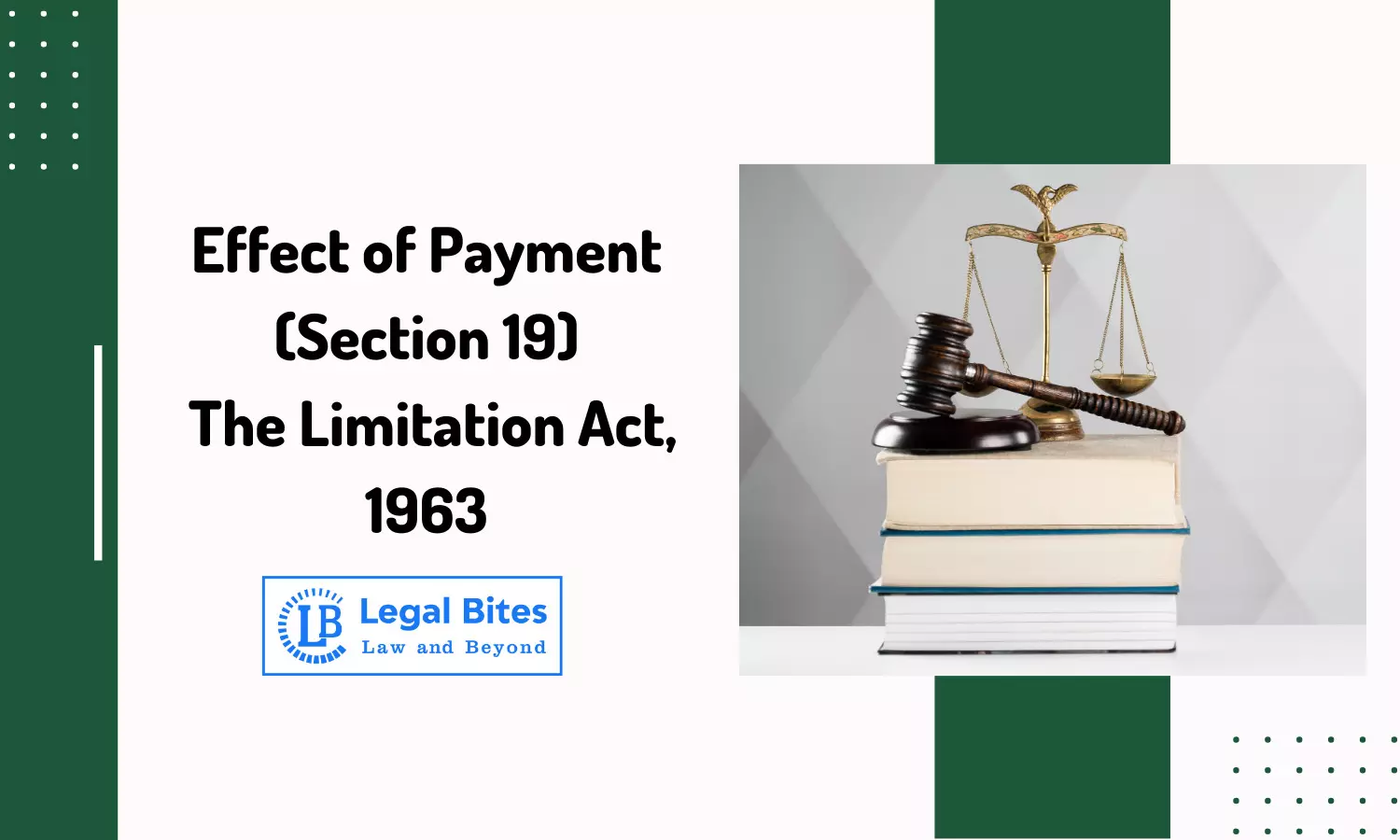Effect of Payment (Section 19) | The Limitation Act, 1963
The article explores the provisions contained in Section 19 of the Limitation Act, delving into its implications and applications in legal contexts.

This article explores the provisions contained in Section 19 of the Limitation Act, delving into its implications and applications in legal contexts.
Introduction
The law of limitation provides for a fundamental concept in civil law that legal rights have stipulated time limits for their enforcement. The Limitation Act of 1963 (hereinafter as “the Act”) is formulated to prevent undue delay in the initiation of legal proceedings and promote certainty in claims. The Act prescribes legally mandated time limitations for filing various suits or applications for the enforcement and protection of certain civil rights of people.
The periods prescribed for various legal actions in the Act are not rigid and there are certain situations when the stipulated limitation period is relaxed as per the discretion of the court if there is “sufficient cause” for such delay, as provided by Section 5 of the Act. Similarly, the Act has noted certain other circumstances when time limitation periods can be flexible. This has been done for a fair administration of justice, keeping the interests of litigants with meritorious cases in mind. Section 19 of the Act provides for just one of such circumstances.
Section 19 is an important component of the Act which sets out the effects of part-payments or acknowledgements made about certain existing debts and liabilities including interest payments on legacies. Essentially, this provision outlines the power of such payments in activating a fresh limitation period which restarts the prescribed time and further grants additional time for the filing of a claim in court.
The article resorts to analyse and discuss the scope and function of this provision within the framework of the Act in the realm of the jurisprudence of the law of limitation. Further, it also aims to discuss the effect of this provision compared to Section 18 of the Act which is about the effect of acknowledgements in writing. In addition, a couple of case laws about this provision will be discussed as well to get a full understanding of the provision.
Effect of Payment
Section 19 of the Act provides for the effect of payment on account of debt or of interest on legacy. The provision effectively states that when a person or their agent is liable to pay a debt or interest on a legacy, and they make a payment before the expiry of the prescribed period, then a fresh limitation period begins from the date of such payment. However, a condition is attached for the interest payments made before January 1, 1928, that the acknowledgement of the payment in these cases must be in the handwriting of the payer or a writing signed by them.
To clarify this position, it has been mentioned that if a mortgagee is in possession of the mortgaged land, the receipt of rent or produce from that land is considered to be a valid form of payment. Further, it is necessary to note that the term “debt” in this context does not encapsulate the money payable under a decree or order of a court.
This provision only helps in the extension of a stipulated limitation period when payments are made on time, making sure that fairness in legal proceedings regarding debts and legacies is maintained.
This provision is required to be taken with a liberal approach to saving suits or applications from being barred by limitation as long as the benefit of this provision can reasonably be extended to assist the claim otherwise legal and sustainable. The burden of proof of acknowledgement under this provision is on the plaintiff. Such acknowledgement can be a unilateral transaction, and as long as it satisfies the conditions under Section 19, it holds good.
It must be noted that the statement on which the plea of acknowledgement is founded must be related to existing liability. Section 18 of the Act provides for the effect of acknowledgement in writing so it becomes a necessity to read Section 19 in comparison to this provision.
Effect of Section 19 in Light of Section 18
Section 18 of the Act simply states that if someone acknowledges a debt or obligation in writing before the stipulated period expires, then a new period of limitation commences from the date of such acknowledgement. In case the writing lacks a date, oral evidence can be provided for the singing time, but its content cannot be orally confirmed. The acknowledgement doesn't need to specify the property or right precisely, and even if it implies a future payment or is coupled with a refusal, it can still be valid.
After going through both provisions, it becomes clear that the main distinction between Sections 18 and 19 of the Act is the requirement of acknowledgement in writing. While Section 18 specifically calls for a written acknowledgement of a debt, Section 19 is all about acknowledgement through payment or part-payment of the debt or interest on the legacy. Section 18 mentions that a mere acknowledgement of debt in writing before the fixed time leads to the commencement of a fresh limitation period while Section 19 requires acknowledgement of any payment made in furtherance of such debt, given that if such acknowledgement is made before January 1, 1928, it must be in writing.
Important Case Laws
[1] Kamla Devi v. Pt. Mani Lal Tewari, (1976) 4 SCC 818
This is a classic case of Section 19 wherein the scope of Section 19 was taken into consideration to hold that the acknowledgement of payment about a registered mortgage deed is not required to be itself registered. The court observed that the function of Section 19 is to provide a later date to count the limitation period again, i.e., a fresh period of limitation is calculated from the time when an acknowledgement is signed. It does not matter whether the acknowledgement is itself registered or not.
Section 19 only postpones the date of the estimated limitation period and does not create a distinct substantive limitation as the latter depends on the relevant articles as provided by the Act. In the instant matter, the court held Article 116 of the Act to be applicable which was of six years and counted from the date of acknowledgement.
[2] Reet Mohinder Singh Sekhon v. Mohinder Parkash, (1989) 4 SCC 30
The instant matter deals with the rights of a mortgagee which includes the amount borrowed initially and the interest that is accumulated. The court noted that these rights include the right to receive the original mortgage amount as well as the accrued interest. In addition, the mortgage has rights and interests in recovering the original mortgage and reclaiming the sold mortgage land. The fact that the recitals in the sale deed were written to acknowledge and confirm that the money owed from the mortgage was still not fully settled and that the mortgagor had a subsisting right of redemption attracted Section 19 of the Act.
The court affirmed that the period of limitation cannot be extended just by mentioning it in a document. To be valid, the acknowledgment must confirm the existing debt and show an intention to admit the jural relationship between the parties. In the end, the court set aside the High Court order which affirmed the order of the Additional District Judge and the said appeal was allowed.
Conclusion
In a nutshell, Section 19 of the Limitation Act plays a vital role in the law of limitation by enabling partial payments or acknowledgements to renew debts and restart the limitation period for certain legal claims. When utilised properly, this provision grants important relief from the rigid limitation periods. However, certain ambiguities remain regarding acknowledgements, liability scope, etc., but the judiciary is constantly clarifying certain positions, some of which have been discussed here. In the end, this provision provides for flexibility in time-barred claims and maintains a balance between adherence to the rule of law and the administration of justice.
References
[1] Dr. Medha Kolhatkar, Commentary on the Limitation Act, 12th Edition, 2019
[2] Shriniwas Gupta, Textbook on The Limitation Act, 1st Edition, 2020

